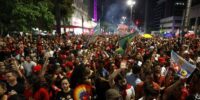
La bioeconomía no salvará al Amazonas
La selva amazónica, uno de los recursos naturales más vitales del mundo, desempeña un papel crucial a la hora de mantener la estabilidad climática y salvaguardar la biodiversidad. En tanto el calentamiento global y la deforestación empujan al Amazonas hacia un punto de inflexión catastrófico, el interrogante en la mente de todos es cómo preservarlo.
El consenso emergente parece ser que la mejor manera de proteger al Amazonas es desarrollar la “bioeconomía”. En los últimos años, esta idea ha sido respaldada por los conservacionistas y por diversas organizaciones, entre ellas el gobierno de Brasil, filantropías privadas como la Fundación Moore, donantes bilaterales como la Agencia de Estados Unidos para el Desarrollo Internacional, instituciones multilaterales como el Banco Interamericano de Desarrollo y organizaciones prominentes como el Foro Económico Mundial y el Instituto de Recursos Mundiales.… Seguir leyendo »















